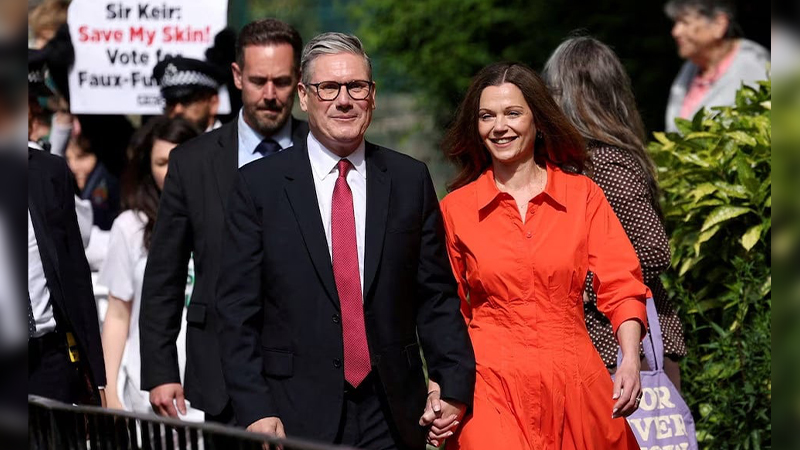Keir Starmer is on course to become the United Kingdom’s next prime minister as the centre-left Labour Party has achieved a commanding victory in the latest parliamentary election. This marks a decisive end to 14 years of Conservative governance under the leadership of Rishi Sunak, who suffered a historic defeat.
With votes still being counted from Thursday’s election, Labour has already surpassed the 326-seat threshold needed for a majority in the 650-seat House of Commons. Exit polls indicate that Labour is expected to win approximately 410 seats. In stark contrast, the Conservative Party has only secured 70 seats thus far, signalling one of the worst performances in its history. The Conservatives have faced voter backlash over economic hardships, deteriorating public services, and numerous scandals.
Starmer’s victory speech
Upon retaining his seat in London, Starmer addressed supporters, emphasising a shift towards governance focussed on public service rather than political showmanship. “Tonight, people here and around the country have spoken and they’re ready for change, to end the politics of performance, a return to politics as public service,” he declared. “The change begins right here … You have voted. It is now time for us to deliver.”
Sunak concedes
Sunak conceded defeat, acknowledging the need for reflection within the Conservative Party. “Today power will change hands in a peaceful and orderly manner, with goodwill on all sides,” Sunak stated after reclaiming his parliamentary seat. “There is much to learn and reflect on and I take responsibility for the loss to the many good hardworking Conservative candidates … I am sorry.”
Challenges ahead for Labour
Despite Labour’s resounding victory, polls suggest limited enthusiasm for Starmer and his party. Starmer will assume office during a period of significant economic and social challenges. The nation faces its highest tax burden since the post-World War II era, soaring national debt, declining living standards, and strained public services, notably within the National Health Service, which has been beleaguered by strikes.
Starmer has already tempered some of Labour’s ambitious initiatives, including key green spending proposals, and has pledged not to raise taxes on working people.
Impact of ‘Reform UK’
The election results also underscore the rise of Reform UK, a right-wing populist party led by Brexit advocate Nigel Farage. Reform UK’s campaign, centered on reducing immigration, resonated with many voters, contributing to the Conservative Party’s decline. Reform UK won four seats, with Farage himself securing a parliamentary seat on his eighth attempt and claiming significant voter support in several regions.
“There is a massive gap on the centre-right of British politics and my job is to fill it, and that’s exactly what I’m going to do,” a jubilant Farage announced. “Believe me, folks, this is just the first step of something that is going to stun all of you.”
A European trend
The surge in support for populist alternatives mirrors recent electoral trends across Europe, where far-right parties have gained traction. Unlike France, where Marine Le Pen’s National Rally achieved significant gains, the British electorate opted for a centre-left solution to bring about change.
Future felations and challenges
Starmer has committed to improving relations with the European Union to address post-Brexit issues but has ruled out rejoining the EU. Additionally, he will need to navigate international dynamics, particularly if Donald Trump is re-elected as U.S. President in November. Nonetheless, Starmer has pledged to maintain unwavering support for Ukraine.
Labour’s turnaround
Labour’s triumph represents a dramatic turnaround from the party’s dire situation three years ago, following a severe defeat in 2019. The Conservative Party’s credibility was eroded by scandals, notably the revelations of lockdown parties in Downing Street, and subsequent leadership failures under Boris Johnson and Liz Truss.
Sunak’s decision to call the election earlier than required in May, despite trailing Labour by 20 points in polls, proved to be a miscalculation. His campaign floundered, culminating in a catastrophic result for the Conservatives.
“We deserved to lose. The Conservative Party just appears exhausted and out of ideas,” remarked Ed Costello, chairman of the Grassroots Conservatives. “But it is not all Rishi Sunak’s fault. It is Boris Johnson and Liz Truss that have led the party to disaster. Rishi Sunak is just the fall guy.”
